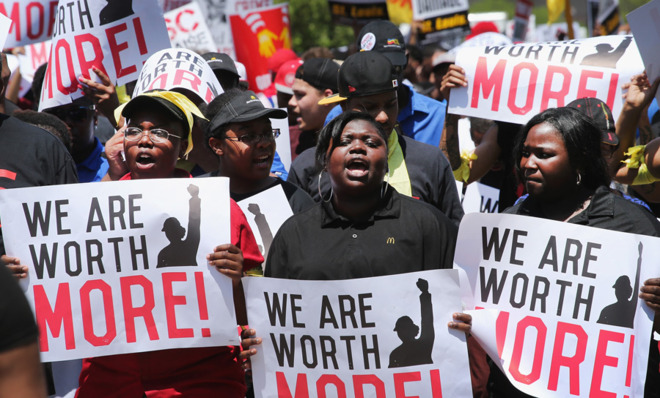Uncertainty is not a gaffe
If only more politicians could be as intellectually honest as David Brat

A free daily email with the biggest news stories of the day – and the best features from TheWeek.com
You are now subscribed
Your newsletter sign-up was successful
When Dave Brat, the Tea Party-backed economics professor who vanquished House Majority Leader Eric Cantor (R) in a Virginia primary last week, was asked whether he opposed the minimum wage, Brat responded uncertainly, saying he did not have "a well-crafted response on that one."
Many are billing Brat's response as a gaffe. But, as Justin Wolfers at The New York Times argues, this was not a gaffe. Economists really have no clear answer on the minimum wage.
Wolfers points to a recent survey of economists undertaken by the University of Chicago's Initiative on Global Markets. The survey asked 38 economists whether they agreed that "raising the minimum wage to $9 per hour would make it noticeably harder for low-skilled workers to find employment." They could answer "agree," "disagree," "strongly agree," "strongly disagree," or "uncertain." Not a single one of them strongly agreed, and not a single one strongly disagreed.
The Week
Escape your echo chamber. Get the facts behind the news, plus analysis from multiple perspectives.

Sign up for The Week's Free Newsletters
From our morning news briefing to a weekly Good News Newsletter, get the best of The Week delivered directly to your inbox.
From our morning news briefing to a weekly Good News Newsletter, get the best of The Week delivered directly to your inbox.
Around a third of the economists surveyed thought that such a minimum wage rise would cost jobs; another third thought it wouldn't; a quarter were uncertain; and the remainder didn't respond to the survey.
Why are economists so uncertain? Over the years, evidence has been quite mixed.
Historically, economists tended to oppose minimum wages on the basis that they reduce employment. Anything that raises the price of labor will reduce demand for it. Milton Friedman called minimum wage laws a form of discrimination against low-skilled workers, and argued that they injured those they were supposed to help.
But in recent years, there have been studies that have shown that the minimum wage didn't reduce employment. For example, this paper by Alan Krueger and David Card found that hiking the minimum wage in New Jersey did not reduce employment. And this paper by Michael Reich, Ken Jacobs, and Annette Bernhardt on minimum wage hikes in San Jose and San Francisco — which now has a $13.15 minimum wage — suggests the same thing.
A free daily email with the biggest news stories of the day – and the best features from TheWeek.com
That may be because in many industries the draw of a major metropolis is big enough to convince firms to accept higher labor costs as another location-related expense, similar to higher rental costs.
Yet other studies — for example, this paper by David Neumark and William Wascher, which reviewed multiple studies — disagree. Neumark and Wascher argue that in the long run, states and cities with a higher minimum wage do suffer from lower employment than those without it. Businesses relocate to where the labor is cheap; that's why so many things nowadays are manufactured in China.
So as Wolfers argues, admitting to being uncertain on this issue isn't a gaffe; it's a mark of intellectual honesty. It is also often the only way to go if you want to come to a balanced conclusion on a complex issue.
It irritates me to no end when politicians feign certainty on complex matters in order to look decisive. Obviously, confidence is an important trait in leadership, but there is a downside to confidence: overconfidence leads to mistakes. Overconfident politicians on the right may try to reduce the minimum wage or scrap it, leaving many low-wage workers unable to meet the cost of living. And overconfident politicians on the left may try to raise the minimum wage so high that it encourages businesses to relocate elsewhere, or replace workers with robots. And overconfident leaders on both sides are blind to solutions (like this one) that fall outside the front lines of whichever political debate is raging fiercest.
John Aziz is the economics and business correspondent at TheWeek.com. He is also an associate editor at Pieria.co.uk. Previously his work has appeared on Business Insider, Zero Hedge, and Noahpinion.
-
 Local elections 2026: where are they and who is expected to win?
Local elections 2026: where are they and who is expected to win?The Explainer Labour is braced for heavy losses and U-turn on postponing some council elections hasn’t helped the party’s prospects
-
 6 of the world’s most accessible destinations
6 of the world’s most accessible destinationsThe Week Recommends Experience all of Berlin, Singapore and Sydney
-
 How the FCC’s ‘equal time’ rule works
How the FCC’s ‘equal time’ rule worksIn the Spotlight The law is at the heart of the Colbert-CBS conflict